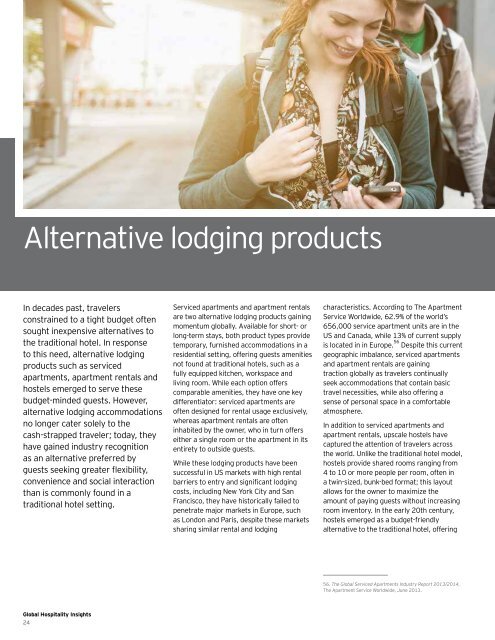0iQESq
0iQESq
0iQESq
Create successful ePaper yourself
Turn your PDF publications into a flip-book with our unique Google optimized e-Paper software.
Alternative lodging products<br />
In decades past, travelers<br />
constrained to a tight budget often<br />
sought inexpensive alternatives to<br />
the traditional hotel. In response<br />
to this need, alternative lodging<br />
products such as serviced<br />
apartments, apartment rentals and<br />
hostels emerged to serve these<br />
budget-minded guests. However,<br />
alternative lodging accommodations<br />
no longer cater solely to the<br />
cash-strapped traveler; today, they<br />
have gained industry recognition<br />
as an alternative preferred by<br />
guests seeking greater flexibility,<br />
convenience and social interaction<br />
than is commonly found in a<br />
traditional hotel setting.<br />
Serviced apartments and apartment rentals<br />
are two alternative lodging products gaining<br />
momentum globally. Available for short- or<br />
long-term stays, both product types provide<br />
temporary, furnished accommodations in a<br />
residential setting, offering guests amenities<br />
not found at traditional hotels, such as a<br />
fully equipped kitchen, workspace and<br />
living room. While each option offers<br />
comparable amenities, they have one key<br />
differentiator: serviced apartments are<br />
often designed for rental usage exclusively,<br />
whereas apartment rentals are often<br />
inhabited by the owner, who in turn offers<br />
either a single room or the apartment in its<br />
entirety to outside guests.<br />
While these lodging products have been<br />
successful in US markets with high rental<br />
barriers to entry and significant lodging<br />
costs, including New York City and San<br />
Francisco, they have historically failed to<br />
penetrate major markets in Europe, such<br />
as London and Paris, despite these markets<br />
sharing similar rental and lodging<br />
characteristics. According to The Apartment<br />
Service Worldwide, 62.9% of the world’s<br />
656,000 service apartment units are in the<br />
US and Canada, while 13% of current supply<br />
is located in in Europe. 56 Despite this current<br />
geographic imbalance, serviced apartments<br />
and apartment rentals are gaining<br />
traction globally as travelers continually<br />
seek accommodations that contain basic<br />
travel necessities, while also offering a<br />
sense of personal space in a comfortable<br />
atmosphere.<br />
In addition to serviced apartments and<br />
apartment rentals, upscale hostels have<br />
captured the attention of travelers across<br />
the world. Unlike the traditional hotel model,<br />
hostels provide shared rooms ranging from<br />
4 to 10 or more people per room, often in<br />
a twin-sized, bunk-bed format; this layout<br />
allows for the owner to maximize the<br />
amount of paying guests without increasing<br />
room inventory. In the early 20th century,<br />
hostels emerged as a budget-friendly<br />
alternative to the traditional hotel, offering<br />
56. The Global Serviced Apartments Industry Report 2013/2014,<br />
The Apartment Service Worldwide, June 2013.<br />
Global Hospitality Insights<br />
24



